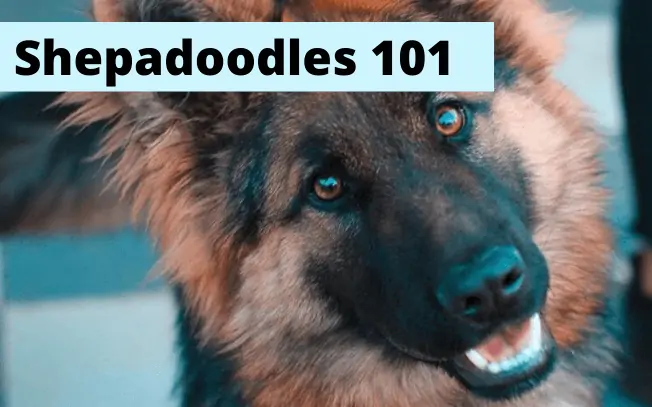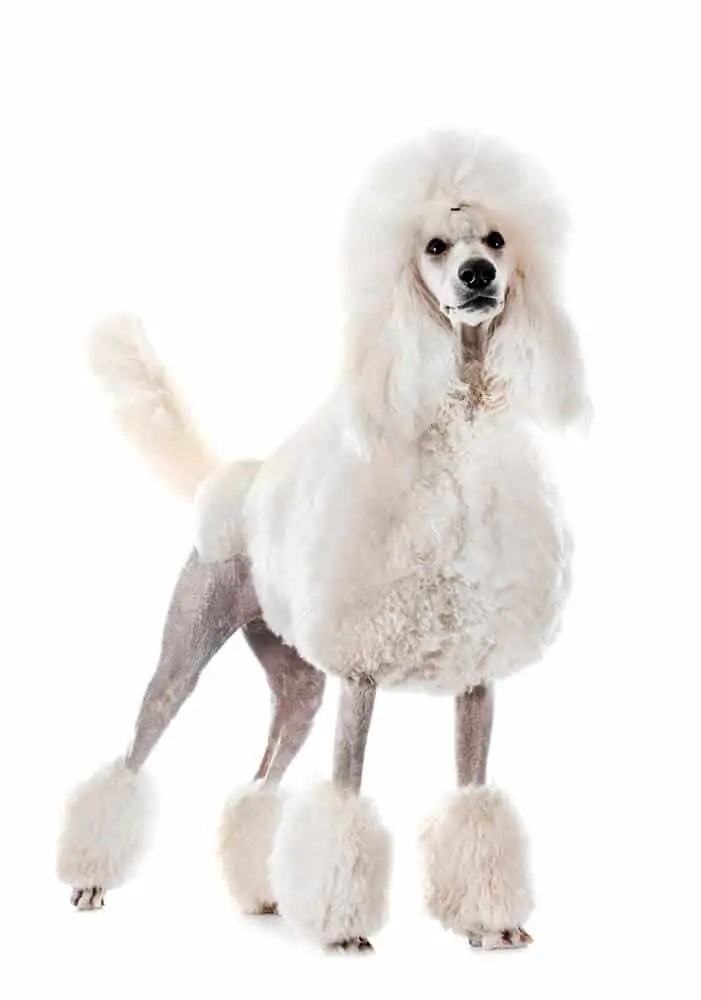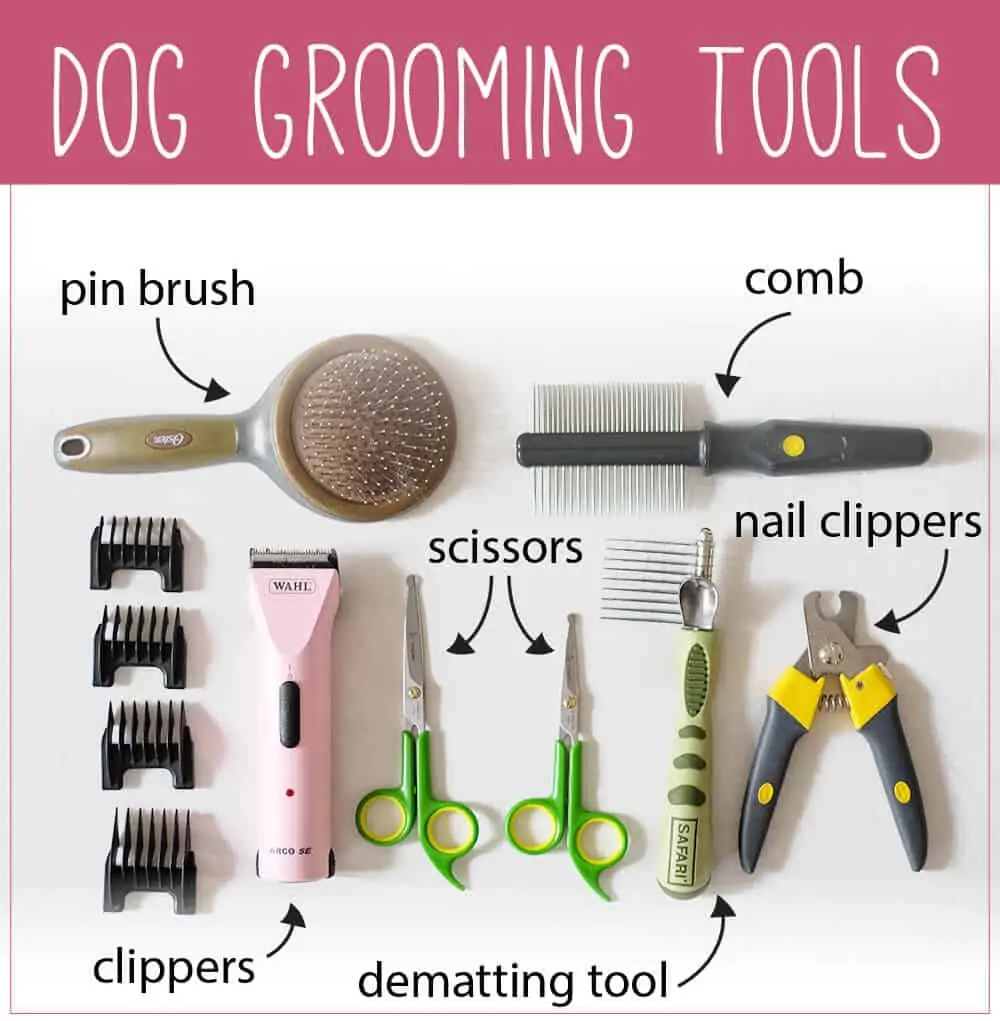Last Updated on

Shepadoodles, a mix between a German Shepherd and a Poodle, are brilliant and loyal dogs.
Known for their intelligence and hardworking nature, many people are turning to Shepadoodles so they can have a dog with the temperament of a German Shepherd with the low-shedding coat of a Poodle.
Today, you’ll learn more about the Shepadoodle, including reasons why they make great family dogs (along with reasons why they aren’t for everybody).
What is a Shepadoodle?
| Shepadoodle Dog Breed Quick Facts | |
| Parents | German Shepherd and Standard Poodle |
| Lifespan | 12-14 years |
| Temperament | Intelligent, hard working, loyal |
Shepadoodles (not to be confused with Sheepadoodles) are a cross between a German Shepherd and a Standard Poodle. You might hear people refer to Shepadoodles as ‘designer dogs’, which is just a fancy way of saying Shepadoodles are mixed breed dogs.
While Shepadoodles are not purebred dogs recognized by the American Kennel Club, they are currently recognized by the American Canines Hybrid Club as a Doodle breed dog.
Shepadoodle Appearance
The appearance of mixed breeds varies, and the Shepadoodle is no different. However, Shepadoodles have some commonalities, so let’s dive into each one so you can get a good idea of what a Shepadoodle looks like.
Colors
Shepadoodles tend to be a mix of black, tan, and brown, similar to the colors of a German Shepherd. However, because Poodles come in an array of colors like white, black, gray, red/apricot, cream, and more, Shepadoodles can also be a variety of different colors depending which color the Poodle parent is.
Coat
Generally, a Shepadoodle has a medium-length coat that is wavy, but they can also have straight or curly hair, or a combination.
In most cases, a German Shepherd Poodle mix will have a no- to low-shedding coat that needs lots of brushing to prevent tangles and mats.
Size
Shepadoodles weigh anywhere from 50 to 90 pounds and have a height of 20 to 28 inches. Their size varies depending on which parent they take after more. For example, when the Poodle parent is more dominant, the Shepadoodle will have a tall and slender frame. But if the German Shepherd parent is more dominant, the Shepadoodle will be sturdier and slightly shorter.
Additionally, if you breed a German Shepherd with a Miniature Poodle, you’ll have a smaller version of the Shepadoodle, known as a Mini Shepadoodle.
Personality and temperament of a Shepadoodle
As the Shepadoodle is a mixed breed dog, we will look at the characteristics of both parent breeds to help us understand the personality and temperament of the Shepadoodle.
German Shepherd

German Shepherds are one of the most popular dog breeds in the world and were originally bred for herding and guarding.
Today, German Shepherds are often employed with the police and military and work as guard dogs, search and rescue dogs, sniffer dogs, and more.
They’re intelligent, studious, and are eager to please their owners.
German Shepherds are very obedient, well-mannered, and faithful companions. They can act as a watchdog and keep you safe and are incredibly loving dogs.
They are affectionate towards their owners and kids are safe with them. German Shepherds are aloof but not aggressive and can be protective and extremely loyal.
Standard Poodle

The Standard Poodle is a brilliant dog breed that was originally bred to retrieve water fowl for hunters. Like German Shepherds, they’re hard-working dogs that are easy to train.
Standard Poodles are active, lively, and fun-loving dogs and make excellent service dogs.
However, they crave attention from their owners and must not be ignored. If left alone for a long time, they can develop a habit of excessive barking. When it comes to socialization, they need early training to be good with other pets and people.
Shepadoodle
Now that we know a bit about the parent breeds, let’s discover what makes a Shepadoodle special.
Loyal
Like both the Poodle and German Shepherd, Shepadoodles are highly loyal to their families.
They form deep bonds with their humans and will go to great lengths to protect and please them.
Shepadoodles are known to be intuitive and responsive to their owners’ emotions, making them excellent emotional support animals.
Intelligent
Shepadoodles come from two highly intelligent breeds and as a result, you can expect the Shepadoodle to be smart as a whip.
This working dog needs daily training and tasks to remain happy. They love when they have something to do.
They are alert and active types of dogs. It’s not advisable to ignore or leave them for a long time. If they become bored or lonely, it will result in destructive behavior.
Protective
Shepadoodles are not only protective of their families, but they also possess strong instincts to guard their territory.
Their protective nature makes them excellent watchdogs, but it’s crucial to ensure that they are well-socialized to prevent them from becoming overly aggressive toward people and other animals outside of the household.
Early socialization and training are essential to help them grow into well-adjusted and friendly pets.
Affectionate
Shepadoodles are not only loyal and protective but also very affectionate dogs who enjoy being close to their families.
They are often referred to as “velcro dogs” as they’ll follow their families from room to room and have a desire for physical contact, like cuddling and being pet.
This makes them great companions for those seeking a loving and devoted furry friend.
However, it’s important to note that Shepadoodles can suffer from separation anxiety if left alone for long periods, so they thrive best in households where someone is present for most of the day.
Energy levels
Shepadoodles have rightfully earned the nickname the Energizer Bunny for their high-energy nature.
These dogs have endless amounts of energy and will love to join you on walks, hikes, runs, and jaunts to a private dog park.
On top of needing plenty of daily exercise, Shepadoodles also need mental enrichment throughout the day. Think brain games like hide and seek, dog treat puzzles, and training.
Remember: the Shepadoodle mixes two highly intelligent and high-energy dog breeds. You can expect to devote at least 90 minutes to 2 hours per day of walks, runs, and training. Some dogs may need a bit more, and some may be fine with less.
Grooming a Shepadoodle

Grooming a Shepadoodle can be a full-time job.
First off, you’ll need to set aside at least 30 minutes every other day (or daily) to brush and comb their hair. If you slack off on this, your pooch can get painful tangles and mats that can lead to skin lesions and infections.
You’ll also want to take them to the groomer every six to eight weeks for a trim, nail clipping, and ear cleaning.
And let’s not forget about oral hygiene—taking your pup to the doggy dentist once a year for a plaque removal and teeth cleaning will keep their teeth in good health.
Price of Shepadoodle puppies
Designer dog breeds tend to command higher prices, and the Shepadoodle is no exception.
Shepadoodles cost anywhere from $1,000 to $3,000 and up depending on where you live and how much demand there is for Shepadoodle puppies in your area.
Health issues and life expectancy
Healthy Shepadoodles can live as long as 12 to 14 years of age.
And just like other dog breeds, the German Shepherd Poodle mix is also prone to health problems like:
- Progressive Retinal Atrophy (PRA): Progressive retinal atrophy is a degenerative eye disease that can lead to blindness in dogs.
- Bloat: Bloat, also known as gastric torsion or twisted stomach, happens when the stomach fills with gas and twists on itself, which can be life-threatening if not treated immediately. Bloat occurs in broad chested dogs like Poodles and German Shepherds.
- Elbow and hip dysplasia: Elbow and hip dysplasia are genetic conditions that affect the joints of dogs, causing pain and mobility issues.
Why you shouldn’t get a Shepadoodle
It’s undeniable that the Shepadoodle is a great family dog, but that doesn’t mean they are great for all families.
Here are a few reasons not to get a Shepadoodle.
1. You live in a small living space
Apartment living is challenging for the Shepadoodle. If you live in an apartment or a small living space, a Shepadoodle may not be the right choice.
Shepadoodles need lots of room to romp and play and it will be hard to contain a very active dog inside an apartment.
The ideal place for the Shepadoodle is a house with a backyard. That way, it can run around outside the house and avoid accidents at home.
Solution: if you have a small living area without access to a backyard, you need time to take your Shepadoodle dog on many walks. Finding an outdoor space and playing fetch is also a great way to burn off some energy (so long as your Shepadoodle has good recall).
2. You’re not home during the day
You need to have a lot of energy and time if you want to take care of a Shepadoodle, and this is challenging if you are away all day.
These dogs are active and energetic. If you want to have a lazy pet, the German Shepherd Poodle mix is not for you. They require constant attention, and they hate being left alone.
Solution: doggy daycare is an excellent solution for someone who feels they’d be a great owner for a Shepadoodle aside from their busy schedule. Daycare ensures your Shepadoodle can interact with other people and dogs throughout the day and burn off energy. You can also consider hiring on dog walker on days you aren’t able to be home often.
3. You don’t want a dog that needs lifelong training
German Shepherds and Poodles are working dogs needing mental stimulation to avoid developing nervous habits.
Shepadoodles will suffer from emotional distress if they miss their daily tasks and if you don’t start training them at a young age.
Enrichment is important for this dog to stay sharp. Consider doing things like agility training or K9 Nose Work to keep your Shepadoodle mentally stimulated.
Solution: some daycares offer additional training packages on top of their daily care. You can see if they can work with your Shepadoodle on a daily basis to keep up with their mental enrichment.
4. You’re an inexperienced dog owner
German Shepherds and Poodles are two breeds known for their intelligence and work ethic. When these breeds are combined to create a Shepadoodle, you can expect a pup with a keen mind and a strong desire to work.
However, this also means that they need a confident and knowledgeable leader to guide them. If you’re not willing to put in the time and effort to train your Shepadoodle, then you might not be the right owner for them.
Improper training can lead to problematic and even aggressive behavior. This breed requires an experienced owner with a firm grasp of dog training to ensure they receive the proper guidance and socialization they need.
Solution: contact a reputable dog trainer and see what they recommend you learn before you get a Shepadoodle. They may recommend books and training sessions for both you and your pup.
5. You don’t want to put in the time required to groom them
Owning a Shepadoodle is a bit like taking care of a baby (a very hairy baby, that is!).
Aside from the physical training and exercise they need, this dog also needs constant grooming.
Although they have a low shedding coat, it has to be maintained, which means lots of combing, brushing, and detangling.
Shepadoodles need daily detangling and brushing, which can take up to 30 minutes each day or every second day (if the hair is kept long).
Aside from that, you need to bring your pet to the grooming salon at least every six to eight weeks.
Solution: you can keep your Shepadoodle’s hair shaved down if you don’t have time for all that brushing. I personally keep both my Sheepadoodle and Labradoodle’s coats short to save me from all that combing and brushing—plus, I love the look when their hair is short!
Where to find a Shepadoodle puppy
Ok, so you’ve learned what a Shepadoodle’s personality is like, you’ve read why you shouldn’t get one (and are ok with all of the above!) and now you’re wondering where you can find Shepdoodle puppies.
There are two options:
1. Reputable breeder
The first place you can find Shepadoodle puppies is from a reputable breeder.
A good breeder will test both parents for diseases to make sure you end up with a healthy dog. Here are some breeder red flags to watch out for:
- They are willing to send the puppies to the owners before eight weeks (a six to seven week old puppy is NOT fit to leave their mom just yet).
- They won’t show you health testing certificates. Every breeder must test the parent dogs to ensure no diseases are being passed onto the pups.
- The puppy comes with no guarantee.
- They don’t raise the puppies with the parent dogs on site. The parent dogs, especially the mom, will help raise the puppies and teach them things like bite inhibition and how to play properly with others.
- They won’t let you meet the dogs. You should be able to meet the parent breeds to see their temperament and personalities.
Avoid breeders who display these warning signs and instead seek out those who uphold ethical standards.
A reputable breeder will be happy to answer your queries about Shepadoodle puppies and will also ask questions to ensure the puppy is placed in a suitable home.
2. Rescues and shelters
The next place to find Shepadoodle dogs and puppies is from dog rescues and shelters. Often, you can find many Poodle mix dogs waiting for homes in shelters. To start, look through our list of Doodle rescues. We found our Labradoodle in a shelter, and he’s absolutely incredible.
Conclusion
German Shepherd Poodle mix dogs are intelligent dogs that make excellent pets when properly trained and socialized.
They’re wonderful companions for active families and will want to join you on every adventure you take!
Have you ever met a Shepadoodle? Tell us what it was like in the comments below.
FAQs
Shepadoodles are intelligent and eager to please, but they require a confident dog owner who is experienced in owning working breeds.
When properly trained and socialized, Shepadoodles make fantastic family dogs. They’ll get along with everyone in your family including children and other dogs.
No, the Shepadoodle is a mixed-breed dog and is not recognized by the AKC.
This article may include affiliate links. www.travellingwithadog.com is a participant of Amazon.com Services LLC Associates Program. As an Amazon Associate, I earn a commission from qualifying purchase. www.travellingwithadog.com participates in other affiliate programs, and recieves commissions when purchases are made through the links. The cost is not inflated to account for the commission earned.
Veterinary Disclaimer: travellingwithadog.com is not a substitute for veterinary advice and does not intend to provide any type of veterinary advice for your animals. Please consult your vet for any questions you have regarding your pets health.

About the Author:
Dana owns a Sheepadoodle and a rescue merle Labradoodle. Her first dog growing up was a white Toy Poodle and she’s loved dogs ever since. She has years of experience fostering dogs and has helped find homes for a variety of different breeds, both large and small! After seeing so many dogs end up unwanted and in shelters, she began blogging about different dog breeds (specifically Doodle dogs, since that’s what she knows best) to help people make informed choices when adding a new member to their family.
When Dana’s not brushing her Doodles’ hair (it takes a lot of time for two!) you can find her playing nose work games and fetch with her two amazing pups.
Learn more about her here.
